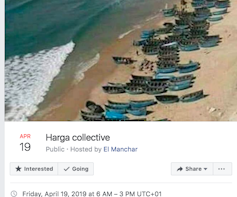On February 10, 2019, Algeria’s state news agency announced that the country’s president, Abdelaziz Bouteflika, would seek a fifth term in the upcoming elections, to be held on April 18. While there had been little public opposition to Bouteflika’s continued reign since he first took office in 1999, this time Algerians have shown increasing resistence. Currently 81 and in poor health after a 2013 stroke, Bouteflika is perceived as an ineffective head of state in a country suffering from a deep economic and structural crisis.
Rather than silence, the announcement was met with a rising tide of nonviolent public protests in Algeria – and possibly the beginning of a new era of resistance against the political regime that has held power since 1962.
Taking to the streets
In the weeks that followed, from Algiers to Oran, people young and old have taken to the streets and campuses to protest the continuing hold of Bouteflika and his inner circle on power, and the president’s inability to lead. Since 2013 his public appearances have been extremely rare, to the point where he failed to meet Saudi crown prince in December, supposedly because he had the flu.
Indeed, Bouteflika is currently reported to be in Switzerland for “medical checks”, even as public opposition to his candidacy intensifies.
Public protests are an unprecedented sight in Algeria, where the regime has violently crushed any form of dissent in recent years. Such was the case during the 1988 “black October” demonstrations followed by a military coup in 1992 and subsequent civil war; the 2001 Kabyle “black spring” in which 160 protesters were reportedly killed; the protests in 2011; and the anti-shale gas movement in 2015.
Despite tensions, a festive atmosphere
Today’s protesters are of all ages and walks of life – students, working men and women, and journalists resisting state censorship. All are calling for a return to the rule of law and demanding that Bouteflika renounce running for a fifth term. As they march, protesters often sing popular football anthems with a political twist to express their demands. Songs ring out from Algeria’s 1962 independence movement and the social movements of the 1980s. In the balconies overhead, women sing out ululating “youyous” in support.
While there has also been anger and indignation, expressed through fiery speeches and unambiguous slogans, violence and clashes with the police have been relatively limited. A “million-man march on Friday, March 1, was reported to be "mostly peaceful”, with the state news agency claiming that 183 people were injured.
Protestors often sing Algerian football songs adjusted for the current situation in Algeria. For more information, see the documentary Babor Casanova, by Karim Sayad (2015).“
The street as public agora
In the absence of state institutions that allow a real political dialogue and without credible elections, the streets of Algeria have become the place where politics is practiced. The moving crowds, rallies and meetings have turned them into a public agora, with those present calling for an end to the rule of Bouteflika and his clan. This includes his brother Saïd and many members of his family or close acquaintances who have a controlling hand state affairs and the economy. In an effort to keep control, prime minister Ahmed Ouyahia has warned that a "Syrian scenario” is possible if Bouteflika isn’t returned to office. On Sunday, the TV station Ennahar reported that Bouteflika was officially a candidate for reelection.
In response, protesters have taken to the social networks to share messages of hope, filling the web with broad smiles and forceful slogans. Twitter posts have remained positive that this time things will be different.
Unlike previous protests, events this year have received some domestic coverage – particularly after journalists protested – both in mainstream media as well as private broadcasts. They’re also gaining an international audience, with support from the Algerian diaspora in Paris, Montreal, Geneva and other cities.
Is the regime losing its grip?
Ongoing coverage shows streets and squares occupied by protestors, with police officers surrounded by demonstrators. Still, there’s a feeling that the regime’s grip on power may be slipping and that the balance of power could be shifting.
So far, the protesters’ strategy has been resolutely nonviolent: peaceful gestures toward the police and civic responsibility sometimes expressed in unexpected ways – including cleaning the streets after demonstrations. But will that be enough?
A fifth term for Bouteflika is unthinkable for many, yet the future is uncertain. Algeria stood aside during Arab Spring that brought down authoritarian governments in Egypt, Libya and elsewhere, in part because of memories of the country’s brutal civil war of the 1990s. However, Algeria’s regime has plagued the country with a weak economy that has worsened as oil revenues have plunged. The unemployment rate is currently near 12%, with the youth rate at 29%. Given that half of the population is younger than 25, the continuity of the state is now facing a structural and social crisis of unprecedented proportions.
Despite the Algerians’ desire for emancipation from Bouteflika’s regime, they have a stark choice: the continuation or cancellation of elections. Cancellation is the most risky of the two because it could well trigger a the declaration of a state of emergency and the return of the military to power. Yet the if elections go forward, the regime still holds the keys to power.
On Facebook, groups share the post of the satirical newspaper Al Manchar that symbolically invites Algerians to ‘escape’ on the date of the elections. Facebook
High stakes
Given what’s at stake, should Algerian citizens accept the April 18 elections in the hope that the regime will have received the message, or push for a general strike?
By resisting political pressure and fatalism through non-violence, Algeria’s civil society is seeking to change how power is exercised in Algeria. By peacefully yet insistently calling on the country’s government and ruling clique to let citizens express themselves and truly listen to what they have to say, Algerians are setting an example. Only a pacification of political dialogue and an opening of real debate can change how power is practiced in Algeria, and restore the legitimacy of the nation-state in the eyes of its people.
Translated from the original French by Clea Chakraverty and Leighton Kille.



 Netanyahu to Meet Trump in Washington as Iran Nuclear Talks Intensify
Netanyahu to Meet Trump in Washington as Iran Nuclear Talks Intensify  Federal Judge Restores Funding for Gateway Rail Tunnel Project
Federal Judge Restores Funding for Gateway Rail Tunnel Project  U.S. to Begin Paying UN Dues as Financial Crisis Spurs Push for Reforms
U.S. to Begin Paying UN Dues as Financial Crisis Spurs Push for Reforms  Trump Lifts 25% Tariff on Indian Goods in Strategic U.S.–India Trade and Energy Deal
Trump Lifts 25% Tariff on Indian Goods in Strategic U.S.–India Trade and Energy Deal  India–U.S. Interim Trade Pact Cuts Auto Tariffs but Leaves Tesla Out
India–U.S. Interim Trade Pact Cuts Auto Tariffs but Leaves Tesla Out  Nasdaq Proposes Fast-Track Rule to Accelerate Index Inclusion for Major New Listings
Nasdaq Proposes Fast-Track Rule to Accelerate Index Inclusion for Major New Listings  Trump Allows Commercial Fishing in Protected New England Waters
Trump Allows Commercial Fishing in Protected New England Waters  Missouri Judge Dismisses Lawsuit Challenging Starbucks’ Diversity and Inclusion Policies
Missouri Judge Dismisses Lawsuit Challenging Starbucks’ Diversity and Inclusion Policies  Iran–U.S. Nuclear Talks in Oman Face Major Hurdles Amid Rising Regional Tensions
Iran–U.S. Nuclear Talks in Oman Face Major Hurdles Amid Rising Regional Tensions 
































